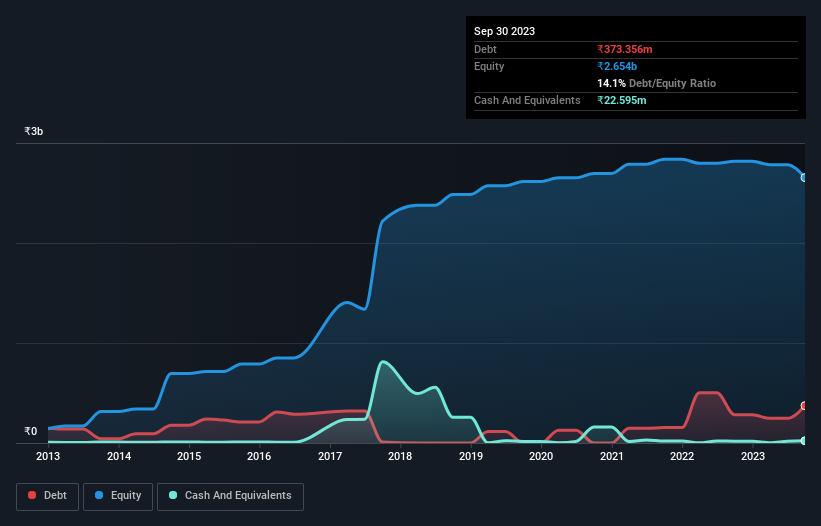Here's Why AksharChem (India) (NSE:AKSHARCHEM) Can Afford Some Debt
The external fund manager backed by Berkshire Hathaway's Charlie Munger, Li Lu, makes no bones about it when he says 'The biggest investment risk is not the volatility of prices, but whether you will suffer a permanent loss of capital.' So it seems the smart money knows that debt - which is usually involved in bankruptcies - is a very important factor, when you assess how risky a company is. We can see that AksharChem (India) Limited (NSE:AKSHARCHEM) does use debt in its business. But should shareholders be worried about its use of debt?
What Risk Does Debt Bring?
Debt and other liabilities become risky for a business when it cannot easily fulfill those obligations, either with free cash flow or by raising capital at an attractive price. In the worst case scenario, a company can go bankrupt if it cannot pay its creditors. However, a more usual (but still expensive) situation is where a company must dilute shareholders at a cheap share price simply to get debt under control. Having said that, the most common situation is where a company manages its debt reasonably well - and to its own advantage. The first step when considering a company's debt levels is to consider its cash and debt together.
View our latest analysis for AksharChem (India)
How Much Debt Does AksharChem (India) Carry?
The image below, which you can click on for greater detail, shows that at September 2023 AksharChem (India) had debt of ₹373.4m, up from ₹282.3m in one year. However, it also had ₹22.6m in cash, and so its net debt is ₹350.8m.

A Look At AksharChem (India)'s Liabilities
Zooming in on the latest balance sheet data, we can see that AksharChem (India) had liabilities of ₹650.4m due within 12 months and liabilities of ₹355.7m due beyond that. Offsetting this, it had ₹22.6m in cash and ₹482.8m in receivables that were due within 12 months. So its liabilities total ₹500.7m more than the combination of its cash and short-term receivables.
Since publicly traded AksharChem (India) shares are worth a total of ₹2.58b, it seems unlikely that this level of liabilities would be a major threat. Having said that, it's clear that we should continue to monitor its balance sheet, lest it change for the worse. There's no doubt that we learn most about debt from the balance sheet. But it is AksharChem (India)'s earnings that will influence how the balance sheet holds up in the future. So when considering debt, it's definitely worth looking at the earnings trend. Click here for an interactive snapshot.
In the last year AksharChem (India) had a loss before interest and tax, and actually shrunk its revenue by 32%, to ₹2.7b. That makes us nervous, to say the least.
Caveat Emptor
Not only did AksharChem (India)'s revenue slip over the last twelve months, but it also produced negative earnings before interest and tax (EBIT). To be specific the EBIT loss came in at ₹134m. When we look at that and recall the liabilities on its balance sheet, relative to cash, it seems unwise to us for the company to have any debt. So we think its balance sheet is a little strained, though not beyond repair. Another cause for caution is that is bled ₹60m in negative free cash flow over the last twelve months. So to be blunt we think it is risky. When analysing debt levels, the balance sheet is the obvious place to start. But ultimately, every company can contain risks that exist outside of the balance sheet. Case in point: We've spotted 2 warning signs for AksharChem (India) you should be aware of, and 1 of them can't be ignored.
If, after all that, you're more interested in a fast growing company with a rock-solid balance sheet, then check out our list of net cash growth stocks without delay.
New: Manage All Your Stock Portfolios in One Place
We've created the ultimate portfolio companion for stock investors, and it's free.
• Connect an unlimited number of Portfolios and see your total in one currency
• Be alerted to new Warning Signs or Risks via email or mobile
• Track the Fair Value of your stocks
Have feedback on this article? Concerned about the content? Get in touch with us directly. Alternatively, email editorial-team (at) simplywallst.com.
This article by Simply Wall St is general in nature. We provide commentary based on historical data and analyst forecasts only using an unbiased methodology and our articles are not intended to be financial advice. It does not constitute a recommendation to buy or sell any stock, and does not take account of your objectives, or your financial situation. We aim to bring you long-term focused analysis driven by fundamental data. Note that our analysis may not factor in the latest price-sensitive company announcements or qualitative material. Simply Wall St has no position in any stocks mentioned.
About NSEI:AKSHARCHEM
AksharChem (India)
Manufactures and sells dyes intermediates, pigments, and inorganic chemicals in India.
Adequate balance sheet with questionable track record.
Similar Companies
Market Insights
Community Narratives



